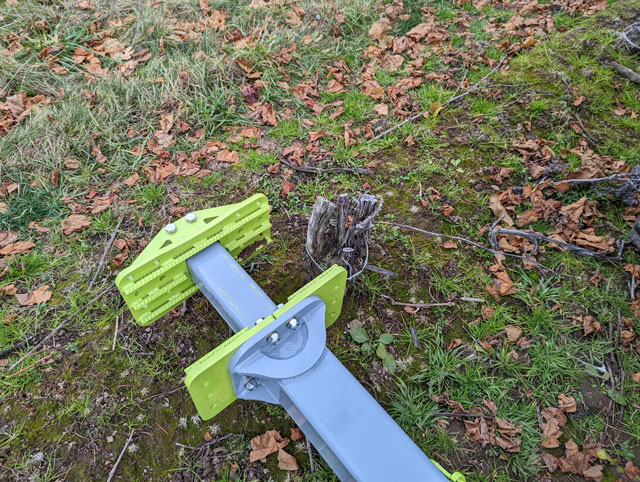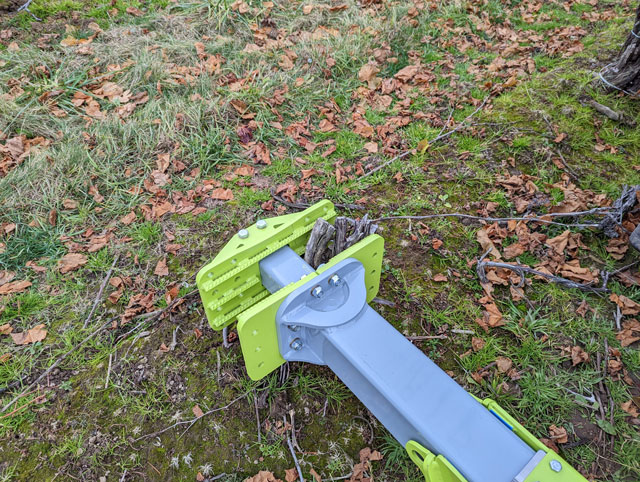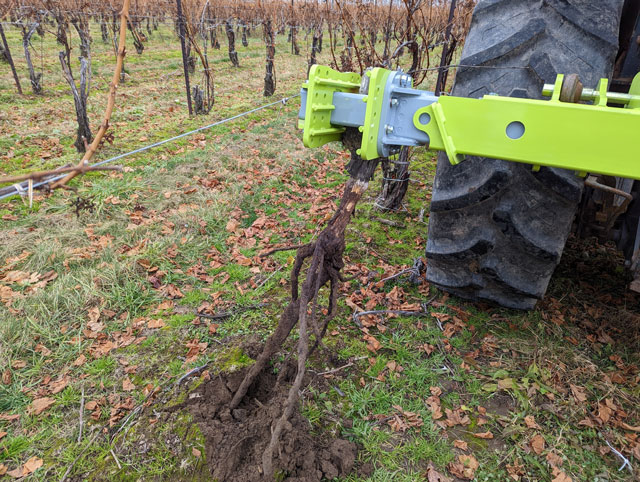Thiessen Tillage of Canada has invented a toolbar for pulling vines or small trees out of vineyards and orchards that mounts to either the front or rear of a tractor.
New Tool Eases Vine Pull - Tractor-Mounted Toolbar Digs Into Job at Lower Cost Than Skid Steers
Thomas Renner | for igus
The objective for original equipment manufacturers is generally the same in most product development tasks. They want to build something that makes the job easier for the end user, more durable and more efficient.
The challenge is more pronounced for agriculture equipment. The dirty, corrosive environment hastens the demise of integral components and solutions that make jobs easier for the equipment operator can take years to research, develop and manufacture.
With those goals in mind, Thiessen Tillage of Canada has invented a toolbar for pulling vines or small trees out of vineyards and orchards that mounts to either the front or rear of a tractor. The toolbar mounts with a 3-point hitch that allows the clamping head to move in and out from the row without having to move the tractor sideways.
Similar products on the market are mounted on skid steers, which allow easy in and out movement from the rows when the farmer is trying to keep the trellising intact in the vineyard. Skid steers, however, are expensive – as in mid five figures expensive – and require some lateral movement instead of direct pulling of the vine, which slows down the process.
Ryan Thiessen developed a solution by nesting cylinders inside telescopic tubing with narrow profile pins. The liner allows the telescoping elements of the vine puller, which are made with steel, to slide against each other while reducing wear and friction.
Design Challenges
Thiessen’s primary challenge was creating a compact solution that allowed the hydraulic clamping head to move in and out of the toolbar.
“We solved that challenge by nesting the cylinders inside of the telescopic tubing with narrow profile pins to secure them so that we didn't need to make room externally for the cylinders and other related components,’’ he said.
The liner is the critical component to the vine puller. The telescoping elements are steel, which can cause significant friction. Lubrication, however, is messy and over time can be expensive.
“I am on a mission to reduce or eliminate grease and grease fittings from agriculture,’’ Thiessen said. “While grease is an excellent lubricant, farming involves a lot of dust and soil. These contaminants quickly become embedded in the grease and create a messy and less effective slurry.”
Grease has been used on equipment dating back centuries. But there are different grades of grease, and using inferior grades can lead to equipment degradation.
Cost is another concern. Most theories suggest equipment owners can add 10-15 percent to the cost of fuel for lubrication.
Farmers are already getting pinched every which way in escalating costs. “Since 2020, the total costs paid by farmers to care for livestock increased by more than $100 billion, or 28 percent, to an all-time high of $460 billion in 2023,” the United States Senate Committee on Agriculture, Nutrition & Forestry said in July 2023. “In percentage terms, the largest increases in input costs were experienced in fertilizers, financing, crop protection tools, livestock and fuels and oils.”

Thiessen Tillage has invented a toolbar for pulling vines and small trees that mounts to either the front or rear of a tractor.

The toolbar mounts with a 3-point hitch that allows the clamping head to move in and out from the row without having to move the tractor sideways.

Components from igus are used in the assembly, and eliminate the need for grease and are durable even in the rugged agriculture environment.
Going Greaseless
Thiessen selected components from igus, the Germany manufacturer of high-performance plastics, to complete the assembly.
He started out by using igus’ B160 tribo-tape, and cut it to fit on the cylinders. “The tribo-tape is easy to apply and cut to size which made it easy to integrate and install into the assembly,’’ Thiessen said.
The tribo-tape liner is designed for versatile lining of tribologically challenged services and shapes and optimizes movement within machine beds. It requires very little space – it has a thickness of .5 mm – and can be purchased with an adhesive back.
Over time, however, Thiessen discovered a different igus product that stood up better to the challenging demands of the application. He switched to an iglide J plate. The product offers low wear against different shaft materials, good resistance to chemicals and low coefficients of friction in dry operation.
The plate is used frequently in plant construction, maintenance equipment, machine construction and medical technology.
“The tribo-tape was awesome and a solid product, but in the end the forces we were experiencing with the vine puller and other heavy vineyard tools was wearing the much softer tribo-tape too quickly and the adhesive had trouble with too much hydraulic oil if a farmer had a leak,’’ Thiessen said. “It is still a very capable product, but in our case mechanically fastened parts we cut from J plate has been a better solution.”
Game-changing Equipment
Thiessen said skid steers might be faster than the 3-point hitch for removing many vines. But not every farmer will have the resources to have a skid steer. Tractors, on the other hand, are a must-have.
“For farmers without skid steers and who pull dead vines annually, having a tool like our vine puller is a better option than always hiring the job out and is still fairly quick,’’ Thiessen said.
The assembly also reduces costs and even labor for end users.
“By moving away from grease and towards more of the high-tech plastics from igus we are able to reduce maintenance time and costs,’’ Thiessen said. “We no longer have to grease equipment and makes it easy to clean because the grease no longer holds contaminants and sticks to the steel. It makes a better, cleaner looking product.”
Customers have embraced the product, Thiessen said, and enjoy having a solution for a frequent problem that can be used on standard equipment.
“They’ve been very happy with the vine puller and the ease of use on standard tractors,’’ he said. “It’s something a lot of farmers encounter, and this is a solution that doesn’t require additional equipment and greatly reduces the use of grease.”
Thomas Renner writes on building, construction, engineering and other trade industry topics for publications throughout the United States.
The content & opinions in this article are the author’s and do not necessarily represent the views of AgriTechTomorrow

igus
In agricultural applications, solutions that can stand up to rough conditions such as dirt, dust, heat, shock and edge loads are essential. Igus makes this possible with its cable carriers and plastic bearings that are characterized by their outstanding resilience and long service life. These products can be used in tractors, disc harrows, fertilizers, field sprayers, and other agricultural equipment. In many applications, metallic bushings or recirculating ball bearing guides can be replaced by self-lubricating polymer plain bearings to not only improve technology, but significantly reduce costs as well.
Other Articles
igutex® bearing range vs bronze bearings
What is the best plain bearing for agricultural machinery?
Farmers Dig Ohio Company’s Efficient Coulter
More about igus
Comments (0)
This post does not have any comments. Be the first to leave a comment below.
Featured Product

